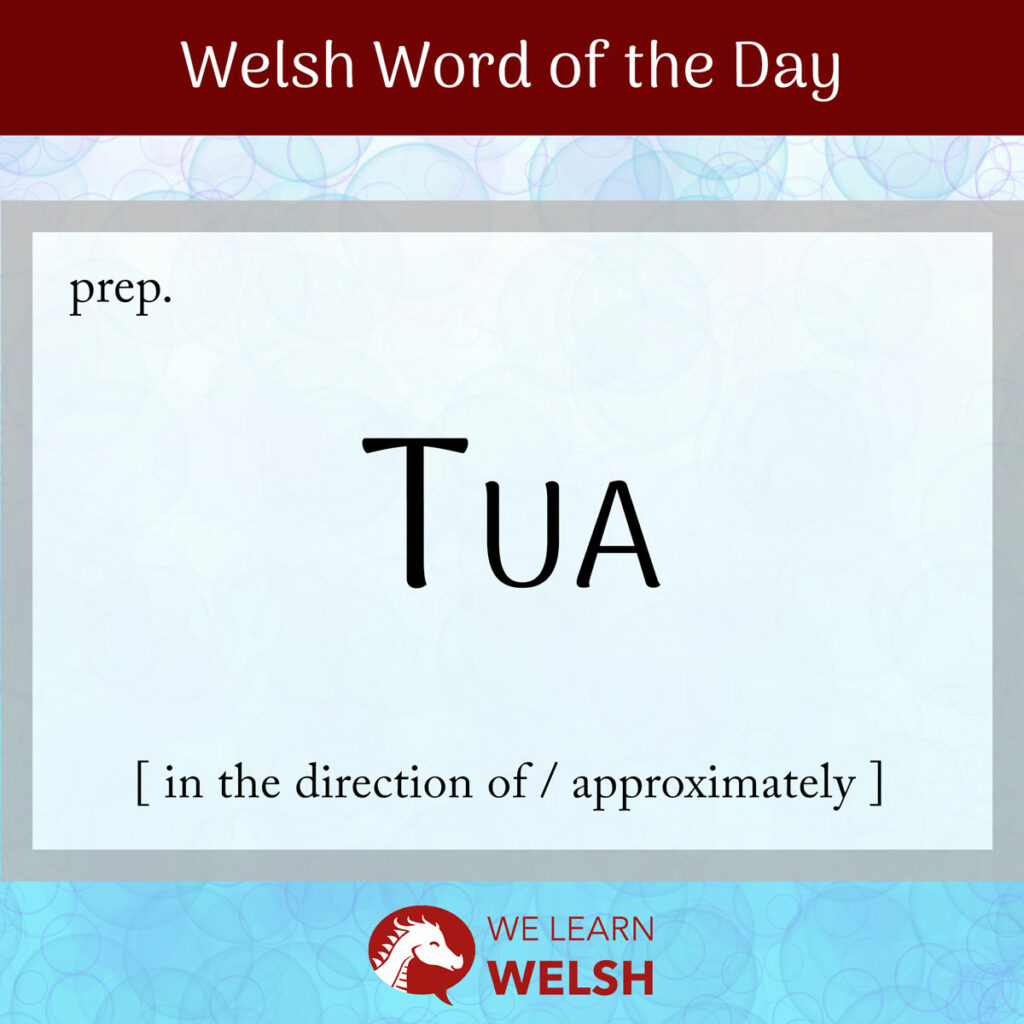One of most confusing things about learning a new language is that words don’t always map directly onto each other. This is particularly the case with Welsh prepositions, the meanings of which tend not to correspond exactly to English prepositions.
And this is very true for the useful little word tua, which can mean either in the direction of, or simply about / approximately.
tua
towards / about
Tua comes from the word tu, which means next to or beside. You may recognise it from phrases like tu allan (outside), tu mewn (inside), y tu hwnt (over there), or tu ôl (behind). It’s been combined with â, which means with.
There are some slight differences in how it should be used depending on the meaning you’re trying to convey.
In modern Welsh, when you are using it to mean in the direction of, it will normally become tuag. This is because it is usually paired with at, and the g sound is added to the make the transition between the two words smoother given the double vowel.
Rhaid i chi yrru tuag at yr eglwys i ddod o hyd i’r ysgol.
You have to drive towards the church to find the school.
So you could say tuag is an alternative form of tua, used before vowels, but this is only true when it means in the direction of. For the second meaning, tua remains tua no matter which word follows it.
To give you a better sense of how it’s used, here are some short example phrases featuring tua:
- tuag at y ddinas = towards the city
- tuag at adref = towards home
- tua’r chwith = to the left
- tua thri o’r gloch = about three o clock / approaching three o clock
- tua therfyn oes = nearing end of life
- tua’r Pasg = around Easter time
- tua’r un maint = about the same size
You might have noticed in some of these that tua is causing an aspirate mutation. For example, about four becomes tua phedwar, with pedwar mutating to phedwar.
Aspirate mutations are dropped a lot in colloquial speech, but it’s worth trying to remember this rule anyway as it’ll still be needed for formal speech or writing.
If you’re using the full phrase tuag at, this causes a soft mutation. You can also use at on its own, and this causes a soft mutation too.
Soft mutation
N/A
Nasal mutation
nhua
Aspirate mutation
thua
Whether tua itself mutates is a slightly more complex topic. As you can see above, it’s not subject to the soft mutation in any circumstances – this is just an irregularity of mutation rules. It can technically nasally mutate, but I can’t think of any phrases where this would be necessary. But the aspirate mutation can come up, for example after the word a (and).
This is quite different to most words in Welsh, which are much more likely to respond to the soft mutation than to the aspirate.
Mae hi’n bert iawn, a thua’r un oed â chi.
She’s very pretty, and about your age.
Again, though, don’t be alarmed if you hear people skip this mutation while chatting; the poor aspirate mutation often gets left out!
There aren’t any direct synonyms that apply equally to both meanings of tua, but there are a lot of words or short phrases in Welsh that have similar meanings to tua or are interchangeable with it in some circumstances. For example:
- i gyfeiriad = in the direction of
- am = about / to / for / intending to
- o gwmpas = about
- o ddeutu = approximately
- ar ddanedd = approaching (literally on the teeth of)
Before we finish up, I have a fun example of tua in context.
There’s a Christmas carol you might have heard of called On to Bethlehem Town. But did you know it’s actually a translation of a Welsh hymn? The song is called Tua Bethlem Dref in the original, and I think it’s really lovely. Here’s a recording for you to enjoy.


